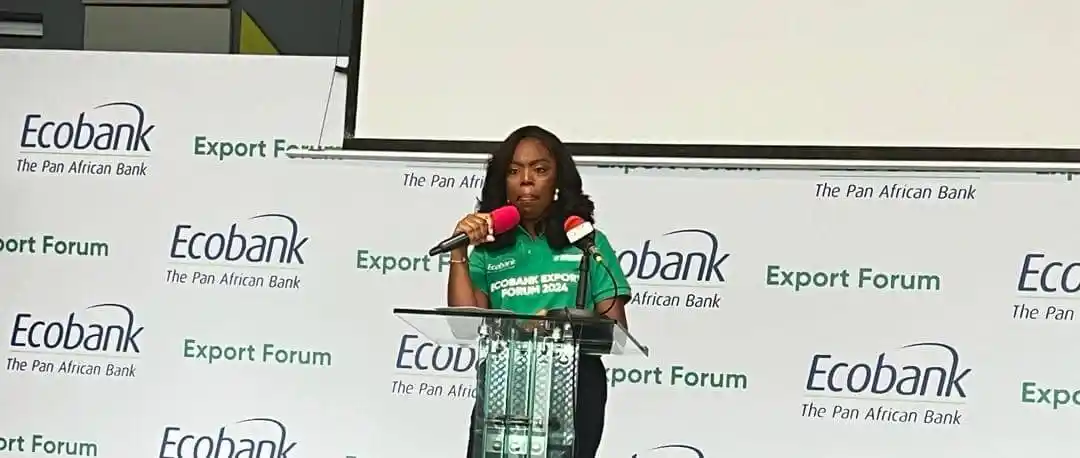In a proactive move to bolster Ghanaian exporters’ expansion into the African continent and beyond, Ecobank Ghana has orchestrated a forum aimed at imparting crucial insights into market requirements and evolving trends in the export market.
Collaborating closely with the Ghana Export Promotion Authority, the forum served as a platform for discussions on enhancing support mechanisms to invigorate export enterprises within the country.
Mrs. Abena Osei-Poku, Regional Executive for Anglophone West Africa and Managing Director of Ecobank Ghana, emphasized the pivotal role of exports in Ghana’s economic framework, emphasizing the bank’s commitment to empowering businesses in the sector.
“Our goal is to provide solutions, which will enhance and enable scalability of export businesses and equip you to take advantage of the numerous opportunities out there. As collaborators, we ought to be ready to meet increasing demands by building capacity to position our export industry, so they can compete favourably in the global marketplace.”
Mrs. Abena Osei-Poku
Mrs Osei-Poku noted that the Africa Continental Free Trade Area (AfCFTA) presents huge opportunities for Ghanaian exporters, adding that Ecobank Ghana is strategically positioned with an array of products and services which are, convenient, reliable, and accessible to support exporters across the continent.
“Our aim is to dialogue with you to enable us better understand your true needs and expectations, so we can serve you better. Let us use this platform to build mutually beneficial business relationships, and also to support the national economy.”
Mrs. Abena Osei-Poku
Ecobank Single Market Trade Hub
Mrs Osei-Poku encouraged the exporters sign onto the Ecobank Single Market Trade Hub, a single platform, which can connect them with other businesses in one big African market with some 1.4 billion people.
The export industry serves as a cornerstone for many Ghanaian households, fostering job creation across diverse sectors and contributing significantly to the nation’s trade balance through foreign currency earnings.

Despite its vast potential, Ghanaian exporters, spanning traditional and non-traditional sectors, have grappled with persistent challenges. These include limited access to financing, which impedes scalability and production capacity enhancement, alongside issues such as inadequate collateral, stringent international trade regulations, and limited technological innovation accessibility.
Nevertheless, Ghana’s export enterprises persist in their endeavors, exhibiting resilience and determination to drive positive economic impact at the national level.
By facilitating collaborative dialogues and knowledge-sharing initiatives, Ecobank Ghana’s forum marks a proactive stride towards equipping exporters with the requisite tools and support to thrive in a dynamic global marketplace.
As Ghana positions itself within the African Continental Free Trade Area (AfCFTA), such initiatives are poised to catalyze sustainable growth and prosperity across the nation’s export market.
Ghana ended 2022 with some USD20billion in export revenue, a demonstration to its robust trading activities on the global stage. Notably, key export destinations included the United Arab Emirates, Switzerland, the United States, India, and China, reflecting the diverse array of markets that Ghanaian goods and services penetrate.
However, a striking observation emerges from this data: the absence of intracontinental exports within Africa. Despite the continent’s vast potential as a trading partner, Ghana’s export focus predominantly gravitated towards regions beyond Africa’s borders.
Addressing this discrepancy, Mr. Abdallah Z. Khalifa Banda, Head of Trade in Services Export, Manufactures & Petrochemicals Department at the Ghana Export Promotion Authority (GEPA), shed light on the changing requirements from overseas markets. At the meeting with the exporters, Mr. Banda delineated the emerging demands and standards set by international markets.
Meanwhile, by understanding and meeting these requirements, exporters can fortify their competitiveness and seize opportunities for market expansion.
READ ALSO: Ghana’s Economy Takes a Hit from Data Service Disruptions





















